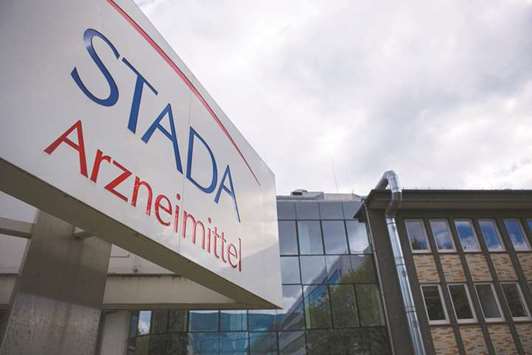Stada Arzneimittel’s months-long sale process unravelled as a small group of the German drugmaker’s investors held out for a better deal than the €5.3bn ($5.9bn) offered by two private equity firms.
Only 65.5% of the shares were tendered in Bain Capital and Cinven’s offer by the Thursday deadline, Bad Vilbel, Germany-based Stada said in a statement late Monday. The suitors were seeking pledges of 67.5%. The two firms said they’ll return any stock received to shareholders.
The shares fell the most in a year, only to pare losses after Reuters reported the firms are talking to investors about a new offer.
Bain and Cinven’s bid of €66 a share prevailed only after weeks of fierce competition as private equity firms seeking control of one of Europe’s last big independent generic- drug companies locked horns. This month, the duo had to lower the acceptance level from 75% and extend the expiration of the offer period from June 8 in an attempt to sway more holders.
“We are perplexed as to why investors didn’t take the deal,” James Vane-Tempest, an analyst at Jefferies in London, said in a note to clients. “We did not anticipate an interloper, or counter-bid, and believe it will take time for fundamentals to command the same kind of premium.”
Stada dropped 3.1% to €59.86 in Frankfurt after falling as much as 8.6%.
Company executives thanked shareholders for what they described as a vote of confidence and said they hadn’t sought an acquirer in the first place.
“We were never looking for a new ownership structure, so the growth strategy will continue as planned,” chief executive officer Matthias Weidenfels said on a conference call yesterday. The takeover proposal is “off the table” for now, he said, and he wouldn’t speculate on what may come next. Stada is always open for new offers, he said.
The maker of Grippostad, which Stada says is Germany’s best-selling cold remedy, aims to garner as much as €2.7bn in sales by 2019 and increase adjusted earnings before interest, taxes, depreciation and amortisation, a key measure of profit, as high as €590mn, up from about €406mn last year. Stada said on Monday that the deal’s collapse won’t affect its 2017 and medium-term financial goals.
Unlike rivals, the company had eluded a takeover for years thanks to an unusual shareholder structure and entrenched management, until investor Active Ownership Capital Sarl led a revolt last year. Former chief executive officer Hartmut Retzlaff resigned after 23 years at the helm in August, paving the way for change. The shares began to soar in December as takeover speculation heated up after languishing at an average price of about €32 over the previous five years.
The drugmaker attracted buyers’ interest from as far away as China as lacklustre profitability left room for slashing costs and streamlining the manufacturing process.
Stada, whose name is derived from the terms standardisation and apothecaries, was born at the end of the 19th century when German pharmacies collaborated to create medicines of a uniform quality that could be sold throughout their network.

Stada Arzneimittel factory is seen in Bad Vilbel, Germany. Stada’s months-long sale process unravelled as a small group of the German drugmaker’s investors held out for a better deal than the $5.9bn offered by two private equity firms.
